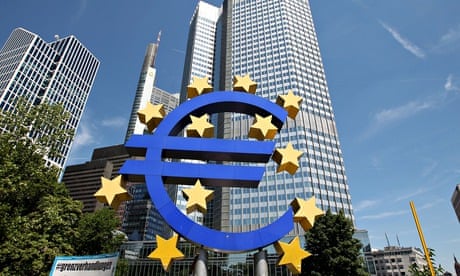Eurozone inflation fell to its lowest level in almost five years in July, bringing the threat of a dangerous deflationary spiral closer.
The annual rate of inflation fell unexpectedly to 0.4% from 0.5% in June, dragged lower by accelerating falls in food, alcohol and tobacco prices. Energy prices also fell sharply, by 1%, compared with a 0.1% rise in June.
It was the lowest level of annual inflation since October 2009, when prices were in negative territory. Economists had expected the annual rate to remain unchanged at 0.5%.
Peter Vanden Houte, chief eurozone economist at ING, said the threat of eurozone deflation was likely to persist.
"[July's] figures don't give any assurance that the eurozone is already out of the deflation danger zone," he said. "Moreover, with the escalating conflict with Russia dampening growth prospects, it seems unlikely that deflation fears will disappear any time soon."
The fear is that weak price pressures could ultimately trigger a dangerous deflationary spiral, where consumers and businesses damage their domestic economies by putting off spending amid expectations that prices will fall further still.
Policymakers at the European Central Bank (ECB) took action in June to stave off the threat of deflation and breathe some life into the currency bloc's flagging economy. The main interest rate was cut to a record low of 0.15% and a €400bn (£317bn) package of cheap funding for banks was announced, with the condition that the money be used to lend to companies outside the financial sector, and not for mortgages.
The ECB also announced it would in effect charge banks to deposit money, by imposing a negative rate of interest of -0.1% on deposits. The hope is that it will encourage banks to lend more to consumers and businesses, boosting the wider economy. However, the central bank stopped short of introducing quantitative easing, where the bank would pump money into the markets by acquiring sovereign bonds directly from financial institutions.
Vanden Houte said the ECB was unlikely to announce further measures to stimulate the economy in the short term, despite July's drop in inflation. This was partly because of a recent fall in the value of the euro, which makes imports more expensive and could therefore push prices higher.
"The good news for the ECB is that the recent weakening of the euro exchange rate takes away some of the pressure to come up with additional monetary easing measures in the near future," he said.
"At the same time, the bank has already given the message that it wants to evaluate first the impact of earlier announced measures, before contemplating additional action. This all but excludes new measures, like outright QE, for the remainder of this year."
In a better sign for the eurozone economy, the region's unemployment rate edged lower to 11.5% in June from 11.6% in May. It was the lowest rate since September 2012, according to Eurostat, the EU's statistics office. The lowest rate was Austria's 5%, followed by Germany's 5.1%. At the other end of the scale, unemployment stands at 27.3% in Greece and 24.5% in Spain.
The number of people out of work in the 18-member bloc fell by 152,000 over the month, to 18.4 million.
Christian Schulz, senior economist at Berenberg, said there was still a long way to go on getting the labour market back on track.
"Make no mistake, the rate of improvement remains modest. At this pace, it would take six years to reduce unemployment from the current 18.4m to pre-crisis boom levels just above 12m."

Comments (…)
Sign in or create your Guardian account to join the discussion